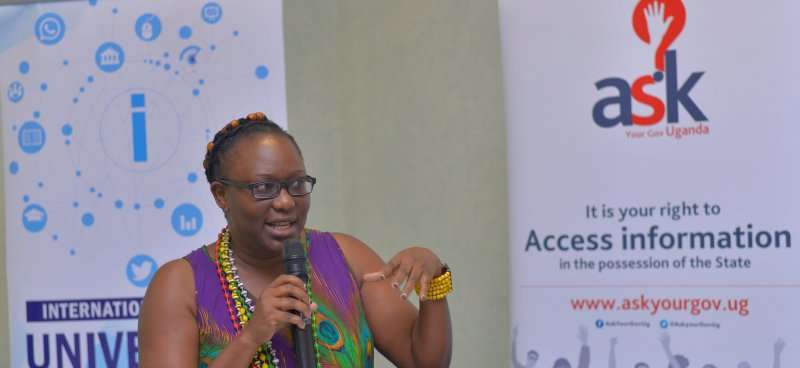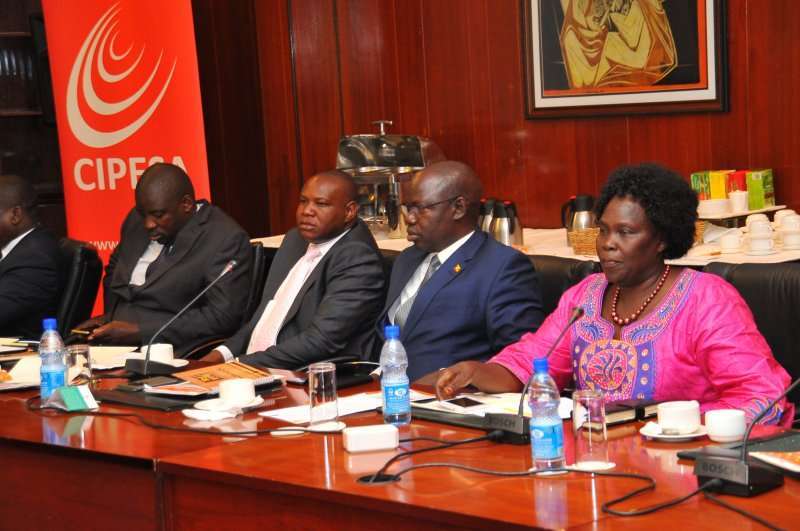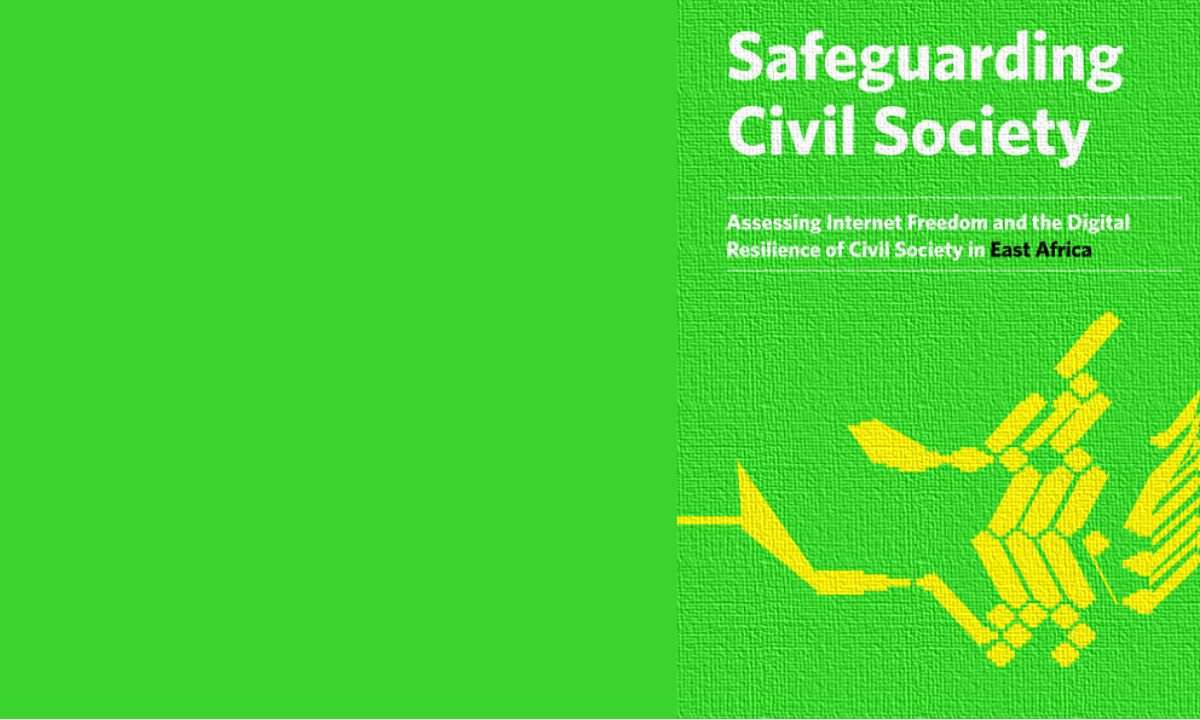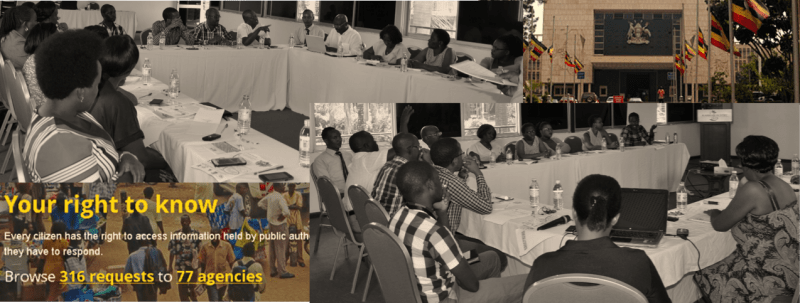By Loyce Kyogabirwe |
Norah Owaraga, a Ugandan researcher, recently narrated her experience on accessing government-held information in the country. She recounted a trip to Tororo district in eastern Uganda where she sought information on Tuberculosis prevalence in prisons. “I was told to go back to the prisons headquarters in Kampala (the capital) to get authorisation yet I had already received clearance from Uganda National Council for Science and Technology (UNCST) and the President’s Office to access government information. Why did I have to travel back to Kampala when I had all the clearance?” asked Owaraga.
Her question was directed at Frank Baine, the spokesperson of Uganda Prisons, during a dialogue held in Kampala to commemorate the International Day for Universal Access to Information, which falls on September 28.
In his response, Baine quoted section 4.8.1(i) of the Code of Conduct and Ethics for Uganda Public Service, 2006 and the Official Secrets Act 1964, stating that public officials are custodians of information that comes into their possession during the course of duty. “Without due permission from an authorising officer, such information cannot be communicated,” explained Baine. In Owaraga’s case, he said the authorising officer was not within the UNCST or the President’s office. Rather, it was the head of Uganda Prisons who had the mandate to authorise the release of the information.
Owaraga’s experience mirrors the challenges faced by Ugandan citizens in realising the right to access information. The right of access to information is enshrined in article 41 of the Constitution of the Republic of Uganda, 1995 which provides that, “Every citizen has a right of access to information in the possession of the state or any other organ of the state except where the release of the information is likely to interfere with the security of the state or the right to the privacy of any other person”. Uganda was among the first African countries to enact a right to information law, the Access to Information Act (ATIA), 2005 and later the Access to Information Regulations, 2011.
The ATIA is aimed at promoting transparency and accountability in all organs of the state by providing the public with timely, accessible and accurate information. Baine’s response instead highlights that a culture of secrecy still persists, with limited proactive release of information by public agencies and denial of citizens’ requests for information.
Other challenges that were raised during the dialogue include the high costs of accessing information, lack of knowledge of the provisions of ATIA among citizens and public officials, and the tedious procedures of requesting for information – all of which impact on the level of citizens’ information requests.
Despite the challenges, the government has taken some steps to promote access to public information. Speaking at the dialogue, Moses Watasa, Commissioner of Information Dissemination at the Ministry of ICT and National Guidance, explained that the Ministry is working to sensitise all government ministries, departments and agencies (MDAs) on ATIA as well as strengthening communication departments within MDAs and local governments with the aim of improving information gathering and dissemination.
Furthermore, the ministry has developed a centralised government information web portal (www.gov.go.ug), which functions as a gateway to all other government websites. The portal is reinforced by the ministry’s requirement for all MDAs to have a communications officer, functional website, a presence on social media and email addresses for officials to ensure public accessibility.
Watasa acknowledged that there has been a culture of secrecy among public officials further compounded by internal bureaucracies. He stated that the government was working to review archaic guidelines that restrict responsiveness or proactive disclosure by public officers.
Meanwhile, according to Watasa the government is also due to launch Open Government Sessions aimed at bridging the information gap between citizens and duty bearers. The sessions, which will be hosted monthly, will involve different MDAs interfacing with the public on functions, ongoing activities, budget allocations and expenditure and feedback. It is expected that the sessions will be broadcast live on TV and leverage social media platforms to allow remote participation.
However, it remains unclear when the archaic laws and guidelines will be reviewed and implemented to ease citizens’ access of public information. It is only through improved access to information that there can be increased social accountability and government transparency towards improved service delivery and greater citizen participation in governance and democratic processes.
The dialogue on access to information in Uganda was organised by the Collaboration on International ICT Policy for East and Southern Africa (CIPESA) in partnership with the Ministry of ICT and National Guidance in the context of the ICT4Democracy in East Africa initiative’s objective to engage stakeholders on supportive policies and practices for human rights and democratic governance in East Africa. It brought together 50 participants including public officials, policy makers, civil society, media, and scholars to reflect on the role of information in improving service delivery and accountability in Uganda.
CIPESA Engages Ugandan Members of Parliament on Implementation of Access to Information Law
By Loyce Kyogabirwe |
It is 12 years since Uganda passed an access to information law with the purpose of promoting transparency and accountability in all organs of the state by providing the public with timely, accessible and accurate information. The law also empowers the public to scrutinise and to participate in government decisions. However, the law has remained largely unimplemented as many Ministries, Departments and Agencies (MDAs) ignore citizens’ requests for information and rarely release information pro-actively, which contravenes the law.
“I have sent several information requests to the Ask Your Government (AYG) Uganda portal. It is now three months and I have never received any feedback,” said Cuthbert Abigaba, Member of Parliament (MP) for Kibaale county in Kamwenge district, while speaking at an engagement of Uganda’s MPs on implementing the Access to Information Act 2005. Organised by the Collaboration on International ICT Policy for East and Southern Africa (CIPESA) on July 13, 2017, the convening was a follow up on an earlier engagement with the MPs on their duties and responsibilities in enforcing the access to information law.
Section 43 of the Access to Information Act requires parliament to receive annual reports from each minister detailing all requests received from citizens for access to records or information, and indicating whether access was granted or not, and where access was not given, the reasons for the denial.
However, Parliament has never received any such reports, nor has it asked ministries to comply with this provision of the law. This issue was also raised earlier in April 2017 when CIPESA presented a position paper on the State of Access to Information in Uganda to MPs on the ICT Committee. The paper highlights some government initiatives to promote access to information, identifies gaps in the law, and makes recommendations for amendments to the law in order to enhance citizens’ access to information.
At the this month’s meeting, CIPESA presented to 16 MPs a comparative analysis of access to information legislation in East Africa and urged the lawmakers to pursue the proposed amendments so as to align Uganda’s law with progressive provisions in some of the East African Community (EAC) Member States’ laws, as well as to international human rights instruments.
“While it is recognised that the EAC region is progressing in promoting the right to information, there are a number of issues that have bottlenecked citizens’ right to information. These include: lack of access to information by non-citizens in Uganda, Kenya and South Sudan; lack of ATI regulations in Rwanda, Kenya, Tanzania and South Sudan; lack of a clear definition of security information by Uganda; lack of provision for transferability of requests in South Sudan; limited scope of bodies the law applies to in Uganda; prohibitive access fees in Uganda, as well as the lack of clear complaints mechanisms in Uganda.” Comparative Analysis of Access to Information Legislation in Africa, June 2017.
During the meeting, the MPs expressed concern over insufficient knowledge among legislators about their duties and responsibilities under the law. They also noted that citizens were not sufficiently aware of their rights and the obligations of public officials. The legislators called for wider awareness raising to increase citizens’ demand for information. “If a Member of Parliament like me did not know the access to information law, what about the citizens who are not even educated?” said Rose Mutonyi, MP for Bubulo West, Manafwa district.
On the other hand, the MPs appreciated the recommendations and proposed amendments contained in the two position papers and suggested an action plan for meaningfully implementing the access to information law. Among the strategies put forward was to engage the Office of the Speaker of Parliament, sensitise more MPs to demand for annual reports from ministers, and engage ministers to submit the annual reports.
Nonetheless, the MPs cited the need for more capacity building on access to information for the majority of legislators to inform their discussions in parliament. As noted by Majegere Kyewalabye, MP for Bunya East, Mayuge district, “We need to be prepared more before we can go on the floor of parliament to present these issues.”
The engagement with MPs was organised by CIPESA in partnership with the Greater Parliamentary North Forum in the context of the ICT4Democracy in East Africa initiative’s objective to engage stakeholders on supportive policies and practices for human rights and democratic governance in East Africa.
Safeguarding Civil Society: Assessing Internet Freedom and the Digital Resilience of Civil Society in East Africa
By Small Media |
Over the past decade, East Africa has seen a tremendous boom in connectivity and online participation that is beginning to transform the way that citizens across the region communicate, express themselves, and establish communities. In a similar manner, the growth of internet access in the region is beginning to empower civil society organisations (CSOs) to engage with the public, share information, and advocate for citizens’ rights in sometimes challenging and closed political environments. Although the internet offers opportunities to advocates, it also offers the possibility for regional state and non-state actors to interfere with their work, surveil them, and censor their voices.
In this report Small Media, the Collaboration on International ICT Policy for East and Southern Africa (CIPESA), DefendDefenders, and Strathmore University’s Centre for Intellectual Property and Information Technology Law have sought to map out the state of internet freedom in East Africa, and assess the extent to which ongoing challenges have impacted negatively upon the work of civil society actors in the region. Although we were not able to map out the state of internet freedom across the entire region, we were able to focus our efforts on some of the lesser-studied digital landscapes – Burundi, Rwanda, South Sudan, Tanzania and Uganda.
To measure the state of internet controls in the region, we have taken the African Declaration of Internet Rights and Freedoms (ADIRF) as our key point of reference. This declaration – drafted and signed by a large array of African civil society organisations in collaboration with global internet freedom organisations – establishes a set of rigorous principles by which governments and other stakeholders must abide in order to guarantee the online rights and freedoms of citizens across Africa.
Over the course of this research, we have found that there is an urgent need for East African civil society to be given support to improve their digital resilience in the face of growing threats of surveillance and censorship across the region. In all of the countries surveyed in this report, CSOs failed to demonstrate a baseline of digital security knowledge, or else failed to implement practices effectively.


At the same time, we found that governments across the region require support to bring their policies into compliance with the principles of the African Declaration on Internet Rights and Freedoms – a set of principles developed by African internet freedom stakeholders to guarantee a free and open internet in Africa.

Small Media, CIPESA, Defend Defenders and CIPIT hope that this research can help to support the security of civil society actors, empower activists to support the principles of the African Declaration, and press their governments to adopt it.
Read the full report here.
The Right To information in Uganda: Unclogging The Bottlenecks
By Loyce Kyogabirwe |
The right to information (RTI) is essential for the functioning of any democracy and is a prerequisite for transparency, accountability, gender equality and citizens’ participation in governance processes. However, Uganda faces numerous challenges to realising the right to access information despite having an access to information law. In the course of 2016, the Collaboration on International ICT Policy for East and Southern Africa (CIPESA) made various interventions to advance RTI, including holding training events and round table discussions for civil society, the media and government officials.
Uganda’s 2005 right to information law remains little known and largely unimplemented. Government Ministries, Departments and Agencies (MDAs) hardly release information voluntarily and tend to be unresponsive to information requests from citizens, due to a culture of secrecy and government bureaucracy that conflict with the law. Conversely, few citizens demand for information as a result of low awareness of their rights and the belief that public officials routinely ignore citizens’ information requests.
At a December 15, 2016 dialogue involving public officials, including information officers from various MDAs, journalists and civil society representatives, it emerged that the government and citizens have not prioritised RTI. “The role of information has been undervalued and sometimes it gets a zero release in [MDA] budgets,” said a public official. Another noted that 11 years after the law was enacted, no MDA has submitted an annual report to parliament on its information disclosure record, including requests received from citizens, as required by the law.
Other challenges prominently cited included under-staffing in MDAs, employing information officers that are unqualified and who often lack mandate to speak on behalf of the public entity, and conflicting laws that make implementing the RTI law difficult.
Journalists shared their experiences of regularly being denied information, often with no reason provided. One journalist noted that informal approaches are the primary means of attaining public information held by the state.
At an earlier training for journalists, which was held on November 23, challenges of public information officers who are either not authorised to release information, or who refer to secrecy oaths not to release information, were prominently cited.
Further, journalists pointed out the cost of accessing information as a hindrance for ordinary citizens. “If it is my right to access information then why am I paying for it?” asked Regina Nassanga of Mama FM. According to the law, a fee of UGX 20 000 (Just over US$ 5) is required when making a formal request at an MDA office.
Despite these obstacles, there are some indications that things could get better. Each government department is now required to have an information officer, and a few public bodies are beginning to implement the government’s 2013 Communications Strategy, although they have been unable to make any significant increase to budget allocations for the information function.
Civil society representatives pointed out additional concerns including the lack of deliberate action to promote RTI particularity for women and people with disabilities. Moreen Nambalirwa from the National Union of Women with Disabilities noted that when information is disseminated to the public via television and radios, people with visual and hearing impairments miss out. She also stated that despite the directive from the Uganda Communications Commission that all TV stations should have a sign language interpretation during some news broadcasts, none of the more than 10 local TV stations have done so, further contributing to the exclusion and limited participation by PWDs in governance processes.
The convenings were organised by CIPESA and provided a space for civil society, public officials and journalists to share their experiences, learn from one another, and suggest possible ways to improve access to information.
Supercharging Human Rights Defenders // East Africa
By Small Media |
Building off the success of our 2016 report ‘Supercharging Human Rights Advocates in the Levant’, the Small Media team is excited to announce our latest project in a whole new region. Making use of the practices we’ve developed in our work across the Middle East, Small Media is setting out to survey the cybersecurity landscape in East Africa. Over the course of this project, we aim assess the state of internet controls in the region, and support the development of a regional community of internet freedom researchers, digital security experts, and human rights defenders.
Over recent years, regional civil society organisations and human rights defenders have been confronted with significant security challenges as internet freedom is threatened across East Africa. The Collaboration on International ICT Policy in East and Southern Africa (CIPESA), one of our local partners for this project, have highlighted various issues involving undue prosecution of Internet users in East Africa in their 2016 State of Internet Freedom in Africa report. In Tanzania this has involved users being targeted and arrested for offenses including ‘insulting the president’ and news sites being shut down. Netizens in Uganda faced blocked social media and mobile money services in the build up to the February 2016 elections, alongside crackdowns on ‘offensive communications’, in the form of bans on social media accounts that criticise the government. Burundian social media users have seen platforms including Viber, Twitter, WhatsApp and Facebook shut down during public protests against government figures. In addition to this, Rwandan citizens face among the world’s worst restrictions on freedom of speech and political activity, including stringent online censorship targeted at those discussing ‘sensitive’ topics.
Freedom House’s 2016 Freedom on the Net report highlights the challenges faced in Rwanda and Uganda, but there are a number of gaps in regional knowledge that we aim to fill. With levels of access to the Internet growing steadily in the region, and some concerning indications of a ramping-up of state efforts to crackdown on internet freedom, it is important that the digital security needs of CSOs and netizens are addressed in an urgent manner.
Thus, focusing on Uganda, Rwanda, Burundi and Tanzania, our research seeks to fill the gap that exists by identifying the digital security threats facing CSOs in the East Africa region, recommending a plan of action and then developing the capacity of CSOs to respond to the threats that they face.
Our Project
The first phase of this project involved working with two of our local partners, CIPESA and DefendDefenders, to select high-quality workshop participants and trainers, in order to create and train a secure, strong and enthusiastic community of regional, on-the-ground digital security experts and researchers. The training given at the workshop has equipped local actors to engage in comprehensive and long-term digital security research, thereby supporting the future needs of CSOs across the region.
Building on the successful outcome of the workshop, our local researchers – working alongside our regional partners – are now hard at work carrying out the core components of the research project, including:
- Legal and Policy Analysis – to assess the current legislative frameworks that exist within East African states, and to establish what powers governments have to monitor and prohibit online communications.
- Network Measurements – to assess the internet infrastructure in each of the target countries. Our researchers are using OONI Probe and ICLab’s Centinel software to establish the level of censorship taking place, and highlight any network vulnerabilities to state-directed internet shutdowns.
- CSO Cyber Capacity Assessments – interviews are being undertaken with a number of CSOs to identify the most urgent digital security threats they face, and to measure their defences.
With the training workshop completed, Small Media and our local partners are currently working with an enthusiastic team of local researchers to carry out the on-the-ground research components. We’ll be busily compiling our research findings over the next couple of months, but we look forward to presenting you with our findings and recommendations upon the report’s publication in March 2017. Stay tuned!
This article was sourced from the Small Media website.





